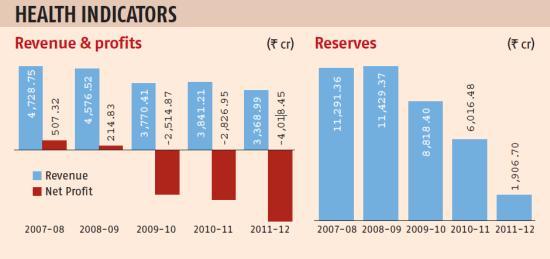Photographs: Courtesy MTNL Sounak Mitra in New Delhi
The downslide in the fortunes of state-owned Mahanagar Telephone Nigam Ltd, or MTNL, which provides fixed-line as well as mobile telephony in Delhi and Mumbai, began in 2009-10.
Till then, it had been making decent profits. That year, MTNL, a Navratna company, or one of the nine jewels of the public sector, reported a loss of Rs 2,514.87 crore (Rs 25.14 billion), which grew steadily to Rs 4,018.45 crore (Rs 40.18 billion) in 2011-12.
As a result, the company runs the risk of losing the prestigious Navratna tag. More important, in the cash-guzzling telecom business, it could be left behind by nimble-footed rivals.
MTNL chairman and managing director A K Garg says the losses have been caused by the huge spectrum fee of Rs 11,000 crore (Rs 110 billion) that the company had to pay for 3G and broadband wireless access, or BWA, spectrum, for Delhi and Mumbai, in 2010.
With insufficient internal accruals, the company had to take debt to buy the spectrum, which had a devastating impact on its finances. Till March 2009, MTNL had Rs 11,429.37 crore (Rs 114.29 billion) of reserves and zero debt in its books.
At the end of 2011-12, the debt stood at Rs 9,647.49 crore (Rs 96.47 billion) and the reserves had dwindled to Rs 1,906.70 crore (Rs 19.06 billion).
"We had no other way but to take loans," says Garg. As a result, MTNL has to pay about Rs 1,100 crore (Rs 11 billion) as interest to banks every year.
"Earlier we used to get about Rs 450 crore (Rs 4.5 billion) a year as interest income. Now, more than double of that amount is the interest outgo every year," Garg adds.
...
Can India's old telecom giant survive?
Image: MTNL's chairman and managing director A K GargPhotographs: Courtesy MTNL
In spite of the huge investments, MTNL, like most others, could not make 3G telephony a success. In hindsight, most of them seem to have overestimated the potential of 3G services. And there seems no solution in sight.
"The company has no money to invest. For 3G (telephony), the infrastructure needs to be upgraded. And tough competition is a concern," says Garg.
However, he adds that MTNL will continue to offer 3G services. "In this competitive market, every operator has to have the latest service offerings in place to maintain sustainability."
A limiting factor for MTNL is that it's restricted to only two of the 22 telecom circles in the country (the other circles are with Bharat Sanchar Nigam Ltd, or BSNL). These circles may be the largest in the country but are saturated and fiercely competitive.
And MTNL, which is owned 56.25 per cent by the government, is a small player: It has only 5.12 million GSM and 0.24 million CDMA subscribers.
That gives it a market share of 0.76 per cent (pan-India), placing it at the bottom of the heap. It does have a fixed-line subscriber base of 3.45 million, but that's hardly a sunrise business.
"We need to boost our services, and increase subscriber base. Over the next two years, we will spend about Rs 250 crore (Rs 2.5 billion) on mobile infrastructure development. This will fetch us revenues of Rs 80 crore (Rs 800 million) per annum," Garg says.
That might be too little, too late. The only additional business in Delhi and Mumbai is the churn - when a customer shifts from one service operator to another. This is where telecom becomes a capital-intensive business.
...
Can India's old telecom giant survive?
Photographs: Business Standard
To lure another company's customer, a service provider has to offer better service by putting up more cell sites, offer compelling tariff, throw incentives at retailers, and invest heavily in brand building.
MTNL can do none of this unless its finances are healthy. That's perhaps the reason why fixing the losses seems Garg's first priority.
Overhauling debt
So, MTNL is working on a financial restructuring package which, it hopes, will bring it out of the red. Thus, MTNL has offered to surrender its BWA spectrum to the government and, in return, wants a refund of the money it had paid.
"We never asked for it. We have never used it. It came to us as a part of the government's initiatives," says Garg. Like 3G spectrum, Garg says there was nothing that MTNL can do with BWA spectrum, as it doesn't have the money to put in place the right infrastructure.
Two, it has sought the government's approval to raise Rs 5,000 crore to Rs 7,000 crore (Rs 50 billion to Rs 70 billion) by issuing sovereign bonds during the current financial year.
"If we get the refund and raise money by issuing sovereign bonds, most of the debt will be wiped off. Then, we will be able to chart the next course of action on the operational front," says Garg.
Garg hopes MTNL to turn cash-positive within the current fiscal year if all its endeavours get government support. Once the debt has been wiped out, and the interest outgo curtailed, Garg says the company will be able to increase revenue by about 5-10 per cent annually.
But, reporting a net profit might take three to four years, he admits. It hopes to close the current fiscal year with revenues of about Rs 3,600 crore (Rs 36 billion).
The company needs to report a profit to retain its Navratna tag, which was conferred on it in 1997. MTNL has already made presentations to the department of public enterprises detailing its plans on how it would improve the financial condition of the loss-making government-owned enterprise.
...
Can India's old telecom giant survive?
Photographs: Pawan Kumar/Reuters
But, will the company benefit by retaining the Navratna status? The answer is not clear.
Ever since it became a Navratna, MTNL has never availed any of the facilities that such a company gets.
But, as Garg says, "Will anybody gain anything by taking the Navratna tag away from us? We need to retain the Navratna tag. This is a status the government has offered us, based on the company's performance over the years. We are working on strategic plans to turn into profit by March to retain the Navratna status."
According to government rules, the Navratna status empowers state-owned enterprises the flexibility to invest up to Rs 1,000 crore (Rs 10 billion) or 15 per cent of their net worth on a single project without seeking the government's approval which other state-owned companies need.
Also, Navratna companies can spend up to 30 per cent of their net worth during a single year without seeking government approval. But, this should not cross Rs 1,000 crore in a year.
Moreover, Navratna enterprises enjoy the freedom to form joint ventures, alliances and also form subsidiaries in overseas market.
Seeking support
The important question is, will the government agree to MTNL's demands? Doesn't it amount to throwing good money after bad money?
"It's true that both MTNL and BSNL need huge support from the government. Both of them have lost market share in all their businesses, especially the fixed-line business. Without the government's backing, they will not be able to focus on mobile and data business," according to a telecom analyst with a management consulting firm.
Garg has another plan. He wants to monetise MTNL's land bank. The company is currently in the process of appointing a consultant to finalise possible ways to monetise its land bank in Delhi and Mumbai. The appointment is expected to take a month or so.
MTNL has about 230,000 square metres that can be used for commercial purpose and another 380,000 square metres of residential land.
...
Can India's old telecom giant survive?
Photographs: Robert Galbraith/Reuters
MTNL hopes to form project-specific partnerships with private companies for development and constructions on these lands. The developed properties will be rented out, but MTNL will continue to own the lands, Garg says.
Besides, the company plans to sell its unused flats and isolated constructed space that could fetch it close to Rs 300 crore (Rs 3 billion). It also expects to earn about Rs 100 crore (Rs 1 billion) in the first year by renting out spaces at the existing buildings of the company.
There are other initiatives as well. MTNL is aiming to increase the contribution of non-voice services such as messaging and other value-added services to its revenue to about 15 per cent this year from 10 per cent last year.
Thus, MTNL plans to offer data services on its 3G network using the mobile virtual network operator (MVNO) route. It expects revenues of about Rs 400 crore (Rs 4 billion) annually from this.
The company will launch the service by January if the government approves the MVNO policy. Besides, it hopes to generate about Rs 300 crore (Rs 3 billion), annually, from the enterprise business.
The company also aims revenues of Rs 200 crore (Rs 2 billion) from advanced technology for small and medium enterprises. MTNL is looking at expanding its data centres business by setting up more capacity across the country, independently as well as with partners.
The company already has data centres in Chennai and Mumbai and is setting up new ones in Hyderabad and Delhi with Software Technology Parks of India.
The company is also looking at ways to cut costs. MTNL has a staff strength of about 42,000, which is almost three times of its required strength.
The company has submitted a proposal to the government seeking assistance for a voluntary retirement scheme (VRS). But, that would cost the company about Rs 5,000 crore (Rs 50 billion).
It forks out about Rs 4,000 crore (Rs 40 billion) a year for staff remuneration and retirement benefits. (The country's largest telecom operator, Bharti Airtel has about 18,000 employees to service over 200 million customers.)
Pension is also a concern. "We have sought government assistance regarding this as well. If the government approves, we would be able to save about Rs 200 crore a year," adds Garg.
However, all this depends on government approvals and how the company implements its plan.







article